Wellbeing resources for carers

Quick Guide to MCAS for Loved-Ones
MCAS is a complex condition and can be hard for our loved-ones to understand. However, their support is crucial for us to be able to manage our condition well. This handy Quick Guide to MCAS is designed to help your loved-one understand MCAS and begin to learn how they can help you. Share this with your loved-ones, so that they can easily understand what MCAS is.

Mandalas Colouring Book with Affirmations
Relaxing and creative activities like mandala colouring can help foster mindfulness and calm a busy mind. Why not spend some time colouring in these beautiful mandalas, drawn by talented Mast Cell Action supporter Ivy Lewis, and lose yourself in your own creative vision. As each colour fills the spaces in this book, may your heart find calm, your mind find focus, and your spirit find strength. You are your own masterpiece.

Navigating MCAS together - Mast Cell Activation Syndrome Support Guide for Loved Ones
This guide is for those who are supporting a loved-one with MCAS, and includes advice on maintaining your own physical and emotional health, as well as practical guidance on how you can support your loved-one.
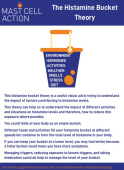
The Histamine Bucket Theory
This histamine bucket theory is a useful visual aid in trying to understand the impact of factors contributing to histamine levels.

Knowing our values
Knowing our values is important to help us to achieve fulfilment. Use this guide to help you plan what you need to be doing in order to feel a sense of purpose and fulfilment.
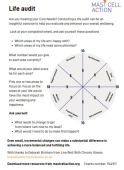
Life Audit
Are you meeting your Core Needs? Conducting a life audit can be an insightful exercise to help you evaluate and enhance your overall wellbeing.

Symptoms of MCAS
This resource details some of the more common symptoms of Mast Cell Activation Syndrome.
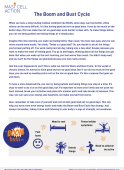
Boom and bust cycle theory for Kids
In the world of chronic illness, it's normal to have good and not-so-good days. But if you do too much on the good days, you can end up needing extra rest on the not-so-good days. It's like a seesaw that goes up and down.
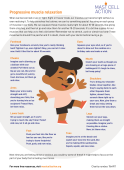
Progressive muscle relaxation
When we feel worried or are in 'fight, flight or freeze' mode, our muscles can become tight without us even realising it. To help ourselves feel calmer, we can try focusing on each group of muscles in our body.

Meditation by Deborah Bircham with music shanti by Annie Brunson
A short mindfulness practice for those feeling illness or discomfort

Mast cells and the mind
A PDF to support our session on mast cells and the mind by Deborah Bircham
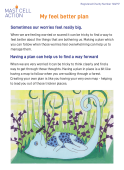
My Feel better plan
When we are feeling worried or scared it can be tricky to find a way to feel better about the things that are bothering us. Download and complete this plan which you can follow when those worries feel overwhelming.
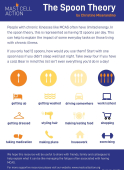
The Spoon Theory
People with chronic illnesses like MCAS often have limited energy. In the spoon theory, by Christine Miserandino, this is represented as having 12 spoons per day. This can help to explain the impact of some everyday tasks on those living with chronic illness.
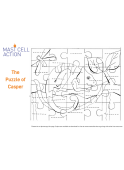
The puzzle of you
In the same way that a jigsaw is made up of lots of different pieces, each of us are madeup of lots of different parts too. This puzzle can help you to talk about MCAS being just one part of that puzzle.
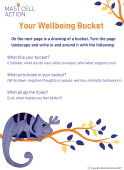
Your wellbeing bucket
An exercise to help children identify the things which make them feel good, those which don't and what helps them to feel better when things aren't going so well.
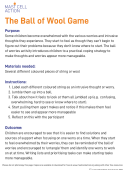
Ball of wool game
The ball of worries activity introduces children to a practical coping strategy to make thoughts and worries appear more manageable.

Parent support leaflet
A leaflet designed to help support parents and carers of children living with systemic mast cell activation and MCAS. It provides suggestions for how to care for your personal wellbeing whilst caring for someone with MCAS, and shares ideas and suggestions for how to communicate and support each other as a family.
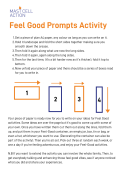
Feel good jar
An exercise to help you find the activities that make you feel good and may help to improve your mood. Suitable for children and adults.
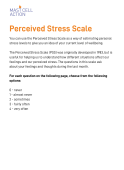
Perceived stress scale - Adults
This worksheet helps you to estimate your personal stress levels and gives you an idea of your current wellbeing.
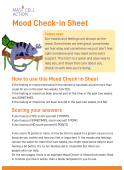
Mood check-in sheet - children
This is a quick and easy resource designed to help you, and those that care about you, to check-in with how you are doing.
Become a friend
Sign up to become a Friend of Mast Cell Action so we can keep you up to date on our progress and on how to get involved in our latest campaigns and initiatives.
Donate
Mast Cell Action relies entirely on the generosity of people like you. Please make a donation now and together we can make a difference to those affected by MCAS.







